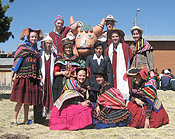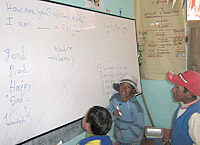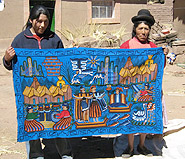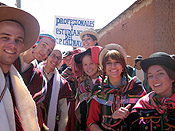Heading to the Peruvian Highlands
Each summer, a handful of students travel to Peru with the Chijnaya Foundation
for a life-changing volunteer trip.
June 2008 - Pomona College
For the third summer since the Chijnaya Foundation was founded in 2006,
students from the Claremont Colleges will spend time in Latin America
working on several projects--from teaching English to tourism development--to
assist different communities in the southern highlands of Peru.
 All photos by Derek Young '09
All photos by Derek Young '09
According to Pomona College Anthropology Professor Ralph Bolton '61,
the Chijnaya Foundation started three years ago when he visited areas
in Peru he volunteered in 40 years ago while in the Peace Corps. During
his Peace Corps tenure, he helped to found Chinjnaya, a village for people
who had been displaced when Lake Titicaca flooded in 1963. Bolton worked
with the Peruvian government to assist in creating homes, agriculture
and activities for the new community located approximately 13,000 feet
above sea level.
The Foundation was created to work with Chijnaya and other local villages to implement health, economic, agriculture, computer technology and education projects. Chijnaya now serves as a model community for other villages relocated after the flooding, so Claremont volunteers are placed in surrounding towns as well. Volunteers spend their time primarily teaching English, but also engage in projects dedicated to raising the standard of living for the indigenous communities. Volunteers stay with families and bond with their temporary parents and siblings.
Volunteer Derek Young '09, says that his favorite time during his 2007 Chijnaya experience was when he stayed in Requena, a town on the shore of Lake Titicaca, while researching the water quality and pollution affecting the area. He stayed with the family of one of the men Bolton knew from 40 years ago.
"Eugenio would bring a chair and sit and talk with me for like one or two hours every night," Young says. "[We would be] sipping on barley tea and eating toasted corn kernels and chatting about life and sharing stories from Peru and from the United States."
Dani Carillo '10 also has fond memories. "My favorite breakfast [was] eggs with diced-up fried potatoes and rice," says Carrillo, who volunteered last summer. "I also enjoyed playing card games and tossing the disk with my sisters."
 For Young, the most rewarding aspect of working on his projects was
seeing the enthusiasm of the students. "I have vivid memories of
playing games with the kids in the class where I would say a word in
Spanish, and they needed to run up to the board to write it in English,
and to see the smile on their faces," he says. "I think we
did a really good job of respecting each other," he adds of the
cultural differences between students and teachers.
For Young, the most rewarding aspect of working on his projects was
seeing the enthusiasm of the students. "I have vivid memories of
playing games with the kids in the class where I would say a word in
Spanish, and they needed to run up to the board to write it in English,
and to see the smile on their faces," he says. "I think we
did a really good job of respecting each other," he adds of the
cultural differences between students and teachers.
In addition to teaching English, volunteers also spend a lot of their time on special projects. One project Carrillo worked on was reviving the bordado business. Bordados are handmade embroideries that used to be sold in the United States in the 1970s; however, Chijnaya lost sales to imitation products and the business eventually died off. Carrillo, along with other volunteers, worked with the women of the community to form an organization to upgrade the quality of the bordados and to send them to exhibitions in the United States. This July, some of the women's work will be featured at the Santa Fe International Folk Art Market in New Mexico.
Politics of Volunteerism
While perspectives on volunteering can vary, some Chijnaya participants
recognized the difficulties of their position in doing humanitarian
work. As can happen with community projects, Claremont students faced
some political and socioeconomic issues as American volunteers in a
developing country, and the sometimes problematic implications of that
in terms of power and structure in a community.
 "I learned a lot about my position," Carrillo says. "I
had to navigate and struggle in trying to integrate myself into the community
without being overbearing." She says that she had to balance trying
to understand other cultures without imposing her own.
"I learned a lot about my position," Carrillo says. "I
had to navigate and struggle in trying to integrate myself into the community
without being overbearing." She says that she had to balance trying
to understand other cultures without imposing her own.
Young had similar thoughts. "We tried very hard not to interfere with the existing political structure in the communities, but [instead] offer a supplement. Mostly, we proposed ideas and allowed these different systems to work with [the ideas]," he says.
Lasting Impressions
In retrospect, last year's volunteers learned a lot from the lifestyles
of the Peruvian families with which they lived in comparison to lifestyles
in the United States.
"For them, time isn't of the essence all the time. They were much more appreciative of everything and were calm and complacent with how things were," Carrillo says.
"I gained an amazing appreciation for people who can spend all of their waking life trying to exist [in poverty] and see, at the same time, that these are the happiest, most friendly, most inspiring people I've ever met. I appreciate the values--[a] more commonsense way to live, where you just take what you need and nothing else," Young says. "I've always believed strongly in that, and it was great to have it reinforced."
Looking Ahead
Bolton says that this summer, the program will try to bring in tractors
for the agricultural communities in the area, as well as work on the
conservation of the vicuña, a close relative of the llama, which
will be raised to provide income from the animals' wool. The
program will also continue working with existing projects, including
the development of tourist facilities, arts and crafts, health services,
and the Chijnaya community's history and archives.
 There will also be assessments of the previous year's projects.
For example, new stoves were installed in homes last year. Traditional
Incan kitchens have stoves that fill kitchens with smoke, affecting the
health and vision of the cooks, who are often women. The new stoves use
a chimney to divert the smoke out of the kitchen and reduce smoke inhalation.
So, as a follow up, there will be surveys to examine the impact of these
stoves this summer
There will also be assessments of the previous year's projects.
For example, new stoves were installed in homes last year. Traditional
Incan kitchens have stoves that fill kitchens with smoke, affecting the
health and vision of the cooks, who are often women. The new stoves use
a chimney to divert the smoke out of the kitchen and reduce smoke inhalation.
So, as a follow up, there will be surveys to examine the impact of these
stoves this summer
Naohito Miura '11 is one of 10 volunteers, seven from Pomona, traveling to Peru for the six-week program this year. As some of the communities look to tourism as a possible means of development, Miura's goal is to examine the pros and cons of how people are impacted by it. With a video research grant he received from the Pomona's Pacific Basin Institute, he will stay in Pucará and document the effects of tourism on the communities in developing countries.
"I was looking for a summer experience, preferably something that
would open up my mind," says Naohito Miura '11, one of 10
volunteers traveling to Peru for the six-week program this summer. "I
just wanted to spend at least a part of my summer volunteering, and do
something hopefully helpful."